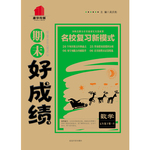


 期末好成绩系列答案
期末好成绩系列答案 99加1领先期末特训卷系列答案
99加1领先期末特训卷系列答案 百强名校期末冲刺100分系列答案
百强名校期末冲刺100分系列答案 好成绩1加1期末冲刺100分系列答案
好成绩1加1期末冲刺100分系列答案科目:高中英语 来源:2014届浙江绍兴第一中学高三上学期回头考英语试卷(解析版) 题型:阅读理解
You hear the comment all the time: the U.S. economy looks good by figures, but it doesn’t feel good. Why doesn’t ever-greater wealth promote ever-greater happiness? It is a question that dates at least to the appearance in 1958 of The Wealthy Society by John Kenneth Galbraith, who died recently at 97.
The Wealthy Society is a modern classic because it helped describe a new moment in the human condition. For most of history, “hunger, sickness, and cold” threatened nearly everyone, Galbraith wrote. “Poverty was found everywhere in that world. Obviously it is not of ours.” After World War II, the fear of another Great Depression gave way to an economic growth. By the 1930s unemployment had averaged 18.2 percent; in the 1950s it was 4.5 percent.
To Galbraith, materialism had gone mad and would cause discontent. Through advertising, companies conditioned consumers to buy things they didn’t really want or need. Because so much spending was artificial, it would be unsatisfying. Meanwhile, government spending that would make everyone better off was being cut down because people wrongly considered government only as “a necessary bad.”
It’s often said that only the rich are getting ahead; everyone else is standing still or falling behind. Well, there are many undeserving rich — overpaid chief managers, for instance. But over any meaningful period, most people’s incomes are increasing. From 1995 to 2004, people feel “squeezed” because their rising incomes often don’t satisfy their rising wants — for bigger homes, more health care, more education, and faster Internet connections.
The other great disappointment is that it has not got rid of insecurity. People regard job stability as part of their standard of living. As company unemployment increased, that part has gradually become weaker. More workers fear they’ve become “the disposable American,” as Louis Uchitelle puts it in his book by the same name.
Because so much previous suffering and social conflict resulted from poverty, the arrival of widespread wealth suggested utopian (乌托邦式的) possibilities. Up to a point, wealth succeeds. There is much less physical suffering than before. People are better off. Unfortunately, wealth also creates new complaints.
Advanced societies need economic growth to satisfy the multiplying wants of their citizens. But the search for growth cause new anxieties and economic conflicts that disturb the social order. Wealth sets free the individual, promising that everyone can choose a unique way to self-accomplishment. But the promise is so unreasonable that it leads to many disappointments and sometimes inspires choices that have anti-social consequences, including family breakdown. Figures indicate that happiness has not risen with incomes.
Should we be surprised? Not really. We’ve simply confirmed an old truth: the seeking of wealth does not always end with happiness.
1.The Wealthy Society is a book ______.
A. about previous suffering and social conflict in the past
B. written by Louis Uchitelle who died recently at 97
C. indicating that people are becoming worse off
D. about why happiness does not rise with wealth
2. Why do people feel“squeezed”when their average income rises considerably?
A. They think there are too many overpaid rich.
B. There is more unemployment in modern society.
C. Their material demands go faster than their earnings.
D. Health care and educational cost have somehow gone out of control.
3. What has wealth brought to American society?
A. Stability and security.
B. Materialism and content.
C. A sense of self-accomplishment.
D. New anxiety, conflicts and complaints.
查看答案和解析>>
科目:高中英语 来源:2012-2013学年浙江宁波市高考模拟英语卷(解析版) 题型:阅读理解
You hear the comment all the time: the U.S. economy looks good by figures, but it doesn’t feel good. Why doesn’t ever-greater wealth promote ever-greater happiness? It is a question that dates at least to the appearance in 1958 of The Wealthy Society by John Kenneth Galbraith, who died recently at 97.
The Wealthy Society is a modern classic because it helped describe a new moment in the human condition. For most of history, “hunger, sickness, and cold” threatened nearly everyone, Galbraith wrote. “Poverty was found everywhere in that world. Obviously it is not of ours.” After World War II, the fear of another Great Depression gave way to an economic growth. By the 1930s unemployment had averaged 18.2 percent; in the 1950s it was 4.5 percent.
To Galbraith, materialism had gone mad and would cause discontent. Through advertising, companies conditioned consumers to buy things they didn’t really want or need. Because so much spending was artificial, it would be unsatisfying. Meanwhile, government spending that would make everyone better off was being cut down because people wrongly considered government only as “a necessary bad.”
It’s often said that only the rich are getting ahead; everyone else is standing still or falling behind. Well, there are many undeserving rich — overpaid chief managers, for instance. But over any meaningful period, most people’s incomes are increasing. From 1995 to 2004, people feel “squeezed” because their rising incomes often don’t satisfy their rising wants — for bigger homes, more health care, more education, and faster Internet connections.
The other great disappointment is that it has not got rid of insecurity. People regard job stability as part of their standard of living. As company unemployment increased, that part has gradually become weaker. More workers fear they’ve become “the disposable American,” as Louis Uchitelle puts it in his book by the same name.
Because so much previous suffering and social conflict resulted from poverty, the arrival of widespread wealth suggested utopian (乌托邦式的) possibilities. Up to a point, wealth succeeds. There is much less physical suffering than before. People are better off. Unfortunately, wealth also creates new complaints.
Advanced societies need economic growth to satisfy the multiplying wants of their citizens. But the search for growth cause new anxieties and economic conflicts that disturb the social order. Wealth sets free the individual, promising that everyone can choose a unique way to self-accomplishment. But the promise is so unreasonable that it leads to many disappointments and sometimes inspires choices that have anti-social consequences, including family breakdown. Figures indicate that happiness has not risen with incomes.
Should we be surprised? Not really. We’ve simply confirmed an old truth: the seeking of wealth does not always end with happiness.
1.The Wealthy Society is a book ______.
A.about previous suffering and social conflict in the past
B.written by Louis Uchitelle who died recently at 97
C.indicating that people are becoming worse off
D.about why happiness does not rise with wealth
2.According to Galbraith, people feel discontented because ______.
A.materialism has run wild in modern society
B.they are in fear of another Great Depression
C.public spending hasn’t been cut down as expected
D.the government has proved to be necessary but ugly
3.Why do people feel“squeezed”when their average income rises considerably?
A.They think there are too many overpaid rich.
B.There is more unemployment in modern society.
C.Their material demands go faster than their earnings.
D.Health care and educational cost have somehow gone out of control.
4.What does Louis Uchitelle mean by “the disposable American” ?
A.People with a stable job.
B.Workers who no longer have secure jobs.
C.Those who see job stability as part of their living standard.
D.People who have a sense of security because of their rising incomes.
5.What has wealth brought to American society?
A.Stability and security.
B.Materialism and content.
C.A sense of self-accomplishment.
D.New anxiety, conflicts and complaints.
查看答案和解析>>
科目:高中英语 来源:2012-2013学年浙江省乐清市高三第四次月考英语试卷(解析版) 题型:阅读理解
You hear the comment all the time: the U.S. economy looks good by figures, but it doesn’t feel good. Why doesn’t ever-greater wealth promote ever-greater happiness? It is a question that dates at least to the appearance in 1958 of The Wealthy Society by John Kenneth Galbraith, who died recently at 97.
The Wealthy Society is a modern classic because it helped describe a new moment in the human condition. For most of history, “hunger, sickness, and cold” threatened nearly everyone, Galbraith wrote. “Poverty (贫穷) was found everywhere in that world. Obviously it is not of ours.” After World War II, the fear of another Great Depression gave way to an economic growth. In the 1930s unemployment had averaged 18.2 percent; in the 1950s it was 4.5 percent.
To Galbraith, materialism (物质主义) had gone mad and would cause discontent. Through advertising, companies conditioned consumers to buy things they didn’t really want or need. Because so much spending was artificial, it would be unsatisfying. Meanwhile, government spending that would make everyone better off was being cut down because people wrongly considered government only as “a necessary bad.”
It’s often said that only the rich are getting ahead; everyone else is standing still or falling behind. Well, there are many undeserving rich — overpaid chief managers, for instance. But over any meaningful period, most people’s incomes are increasing. From 1995 to 2004, people feel “squeezed” because their rising incomes often don’t satisfy their rising wants — for bigger homes, more health care, more education, and faster Internet connections.
The other great disappointment is that it has not got rid of insecurity. People regard job stability as part of their standard of living. As company unemployment increased, that part has gradually become weaker. More workers fear they’ve become “the disposable American,” as Louis Uchitelle puts it in his book by the same name.
Because so much previous suffering and social conflict resulted from poverty, the arrival of widespread wealth suggested utopian (乌托邦式的) possibilities. Up to a point, wealth succeeds. There is much less physical suffering than before. People are better off. Unfortunately, wealth also creates new complaints.
Advanced societies need economic growth to satisfy the multiplying wants of their citizens. But the search for growth cause new anxieties and economic conflicts that disturb the social order. Wealth sets free the individual, promising that everyone can choose a unique way to self-accomplishment. But the promise is so unreasonable that it leads to many disappointments and sometimes inspires choices that have anti-social consequences, including family breakdown. Figures indicate that happiness has not risen with incomes.
Should we be surprised? Not really. We’ve simply confirmed an old truth: the seeking of wealth does not always end with happiness.
1.The Wealthy Society is a book ________.
A.about poverty in the past
B.written by Louis Uchitelle
C.indicating that people are becoming worse off
D.about why happiness does not rise with wealth
2.According to Galbraith, people feel discontented because ________.
A.materialism has run wild in modern society
B.they are in fear of another Great Depression
C.public spending hasn’t been cut down as expected
D.the government has proved to be necessary but ugly
3.Why do people feel“squeezed”when their average income rises considerably?
A.They think there are too many overpaid rich.
B.There is more unemployment in modern society.
C.Their material demands go faster than their earnings.
D.Health care and educational cost have somehow gone out of control.
4.What does Louis Uchitelle mean by “the disposable American” ?
A.People with a stable job.
B.Workers who no longer have secure jobs.
C.Those who see job stability as part of their living standard.
D.People who have a sense of security because of their rising incomes.
5.What has wealth brought to American society?
A.Stability and security.
B.Materialism and content.
C.A sense of self-accomplishment.
D.New anxiety, conflicts and complaints.
查看答案和解析>>
科目:高中英语 来源:2012年新课标版高中英语选修七 Unit5练习卷(解析版) 题型:完型填空
The popular Korean male artist Rain swept through Asia recently, gaining popularity among both male and female fans. 36 his popularity, Pepsi(百事可乐), which did not 37 to offer any Korean artist the opportunity to be one of its ambassadors (大使), has changed their mind. They now have 38 Rain to be its new “blue blood(蓝血家族)” and have offered him a high price.
For the past two years, Pepsi has 39 an enormous amount of money in signing up world popular mega stars to be the company’s ambassadors. They 40 soccer star David Beckham, Taiwan popular Idols F4, Jay Chou, Hong Kong star Edison Chen, Nicholas Tse, Louis Koo etc. Now with the 41 rising of Korean star Rain, Pepsi was quick to put him on its 42.
According to sources, Pepsi has recently sent a(an) 43 to Korea to discuss details with Rain and they are about to 44 a contract. When a reporter called Ms Li to verify this matter, she didn’t deny it, and 45 that “At this point, we can’t reveal anything”. Also according to sources, Pepsi will be the sponsor of Rain’s October 46 in Hong Kong, but Rain’s Hong Kong manager Ms Chan Ka Ying 47 , “At this moment, it’s not 48 to talk about this. There will be an announcement shortly!”
49 the old Chinese saying goes: “One mountain cannot be ruled by two tigers”, Pepsi has somehow created an internal 50 between Rain and Jay Chou. Rain’s popularity is rising and he has the 51 “single eye-lid” feature as Jay, whose status has somehow been 52. There’s a rumour that the skin product brand DHC is intending to 53 their ambassador from Jay to Rain, in order to capture the Korean, Japanese, Chinese 54.
Rain’s recent Beijing concert was a tremendous hit, 55 in “Korean Fever” in Mainland China.
|
1. |
|
|
2. |
|
|
3. |
|
|
4. |
|
|
5. |
|
|
6. |
|
|
7. |
|
|
8. |
|
|
9. |
|
|
10. |
|
|
11. |
|
|
12. |
|
|
13. |
|
|
14. |
|
|
15. |
|
|
16. |
|
|
17. |
|
|
18. |
|
|
19. |
|
|
20. |
|
查看答案和解析>>
科目:高中英语 来源:2011-2012学年浙江省高三上学期期中考试英语试题 题型:阅读理解
He almost didn’t see the old lady, stranded on the side of the road, but even in the dim light of day, he could see she needed help. So he pulled up in front her Mercedes and got out.
Even with the smile on his face, she was worried. No one had stopped to help for the last hour or so. Was he going to hurt her? He didn’t look safe; he looked poor and hungry. He could see that she was frightened, standing out there in the cold. He knew how she felt.
He said, “I am here to help you, ma’am. Why don’t you wait in the car where it’s warm? By the way, my name is Bryan Anderson.”
Well, all she had was a flat tire, but for an old lady, that was bad enough. Bryan crawled under the car looking for a place to put the jack, skinning his knuckles a time or two. Soon he was able to change the tire. But he had to get dirty and his hands hurt.
As he was tightening up the lug nuts, she rolled down the window and began to talk to him. She told him that she was from St. Louis and was just passing through. She couldn’t thank him enough for coming to her aid.
Bryan just smiled as he closed her trunk. The lady asked how much she owed him. Any amount would have been all right with her. She already imagined all the awful things that could have happened, had he not stopped. Bryan never thought twice about being paid. This was not a job to him. This was helping someone in need, and God knows there were many people who had given him a hand in the past. He had lived his whole life that way, and it never occurred to him to act any other way.
He told her that if she really wanted to pay him back, the next time she saw someone who needed help, she could give that person the assistance they needed, and Bryan added, “And think of me.”
He waited until she started her car and drove off. It had been a cold and depressing day, but he felt good as he headed for home, disappearing into the twilight.
1.This story most probably took place_______.
A. in a garage B. on a highway C. in a busy street D. near a gas station
2.When the man approached the old lady, the first thing he did was to______.
A. ask what was wrong with her car B. get the old lady out of her car
C. change her tire as soon as possible D. make her know he wanted to help her
3.The underlined part in Paragraph 6 suggests that________.
A. the old lady had got ready to pay the man
B. the old lady was grateful to the man
C. the man had a lot of difficulty changing the tire
D. the man didn’t stop changing the tire
4.Which of the following words can best describe the man?
A. Warm-hearted and sensitive. B. Careful and serious.
C. Thoughtful and helpful. D. Generous and open-minded.
5. It can be inferred from the last paragraph that ______________.
A. the man was happy after helping the old lady
B. the man received a lot of money from the old lady
C. the man made the old lady feel cold and depressed
D. the man felt extremely frustrated all the way home
查看答案和解析>>
湖北省互联网违法和不良信息举报平台 | 网上有害信息举报专区 | 电信诈骗举报专区 | 涉历史虚无主义有害信息举报专区 | 涉企侵权举报专区
违法和不良信息举报电话:027-86699610 举报邮箱:58377363@163.com